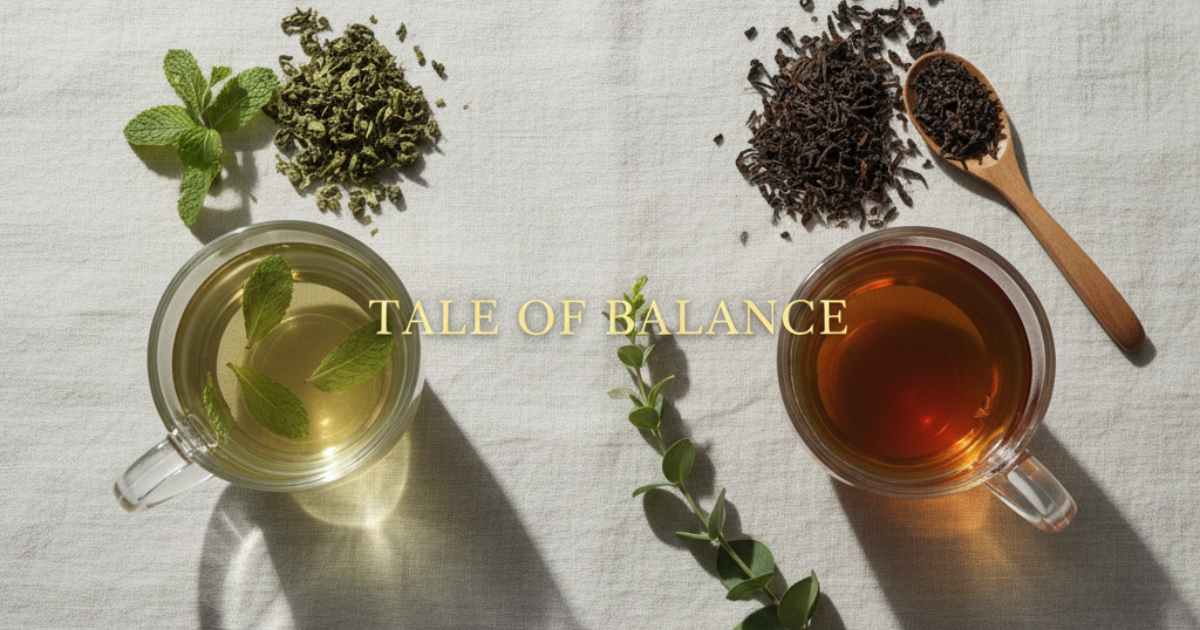Green Tea vs. Black Tea: The Complete Health Comparison Guide

The Great Tea Debate
Walk into any health food store or browse wellness blogs, and you'll encounter passionate advocates for both green tea and black tea, each claiming their preferred brew offers superior health benefits. This ancient debate has only intensified as modern science reveals the remarkable properties of both varieties. But which tea truly deserves a place in your daily wellness routine?
The answer, as with most things in life, is nuanced. Both green tea and black tea originate from the same plant—Camellia sinensis—yet through different processing methods, they develop distinct chemical profiles, flavors, and health benefits. Understanding these differences empowers you to make informed choices aligned with your specific wellness goals.
At Terazi Organics, where our name means "balance," we appreciate that optimal health rarely comes from choosing one option exclusively. Instead, understanding when and why to choose green tea versus black tea—or incorporating both strategically—creates a more comprehensive approach to wellness through nature's most researched beverage.
This complete comparison guide examines the science behind both teas, comparing their effects on cardiovascular health, metabolism, brain function, immune support, and more. By the end, you'll understand not just which tea is "better," but which tea is better for you, your lifestyle, and your unique health priorities.
The Foundation: Processing Makes All the Difference
A. From Leaf to Cup: How Processing Transforms Tea
Both green and black teas begin their journey as fresh leaves from Camellia sinensis, but their processing paths diverge dramatically:
Green Tea Processing: After harvesting, green tea leaves undergo minimal processing designed to preserve their natural compounds:
- Withering: Brief exposure to air reduces moisture content (optional)
- Heating: Steaming (Japanese method) or pan-firing (Chinese method) quickly halts oxidation
- Rolling: Leaves are shaped, breaking cell walls slightly
- Drying: Final heating removes remaining moisture
This gentle process preserves 80-90% of the original catechins—powerful antioxidant compounds—keeping green tea closest to the plant's natural chemical composition.
Black Tea Processing: Black tea undergoes complete oxidation, fundamentally transforming its chemistry:
- Withering: Extended moisture reduction (12-18 hours) makes leaves pliable
- Rolling/Cutting: Cell walls are thoroughly broken, exposing enzymes to oxygen
- Oxidation: Enzymatic reactions transform catechins into theaflavins and thearubigins (2-4 hours)
- Firing: High heat stops oxidation and dries the leaves
This extensive oxidation creates an entirely different phytochemical profile, giving black tea its distinctive color, robust flavor, and unique health properties.
B. The Chemical Transformation
The oxidation process doesn't just change color and flavor—it fundamentally alters the tea's bioactive compounds:
Green Tea's Chemical Profile:
- Catechins: 30-40% of dry weight, primarily EGCG (epigallocatechin gallate)
- Caffeine: 25-40mg per cup (moderate)
- L-theanine: High levels (promotes calm focus)
- Vitamin C: Preserved through minimal processing
- Chlorophyll: Gives green tea its color and provides additional antioxidants
Black Tea's Chemical Profile:
- Theaflavins and Thearubigins: Oxidized catechins (10-20% of dry weight)
- Caffeine: 40-70mg per cup (higher than green tea)
- L-theanine: Present but lower than green tea
- Tannins: Higher levels (contributes to astringency)
- Flavonols: Including quercetin and kaempferol
Understanding these differences helps explain why each tea excels in different areas of health support.
The Health Benefits Showdown: Category-by-Category Comparison
A. Antioxidant Power and Cellular Protection
Green Tea Advantage: Green tea wins the raw antioxidant content comparison. The EGCG in green tea is one of the most powerful antioxidants studied, with research showing it's 25-100 times more potent than vitamins C and E at protecting cells from oxidative damage.
A study in the Journal of Agricultural and Food Chemistry found that green tea contains higher total polyphenol content than black tea—approximately 30-40% versus 10-20%. These polyphenols neutralize free radicals that damage DNA, proteins, and cellular membranes, contributing to aging and disease development.
Scientific Evidence: Research published in the American Journal of Clinical Nutrition demonstrated that participants consuming green tea showed significantly reduced oxidative stress markers compared to those drinking black tea or placebo.
Black Tea Counterpoint: However, black tea's theaflavins and thearubigins offer unique antioxidant properties not found in green tea. These compounds demonstrate particular effectiveness against lipid peroxidation—the oxidative degradation of fats that contributes to cardiovascular disease.
A study in Molecular Nutrition & Food Research found that black tea's oxidized polyphenols may actually have better bioavailability in some individuals, meaning your body can use them more effectively despite lower total content.
Verdict: Green tea provides higher total antioxidants, making it superior for general cellular protection. However, black tea's unique antioxidant profile offers specific benefits, particularly for cardiovascular health.
Terazi Application: Our Glacier Mint Green Tea and Calming Lavender Green Tea provide maximum antioxidant benefits, while our English Breakfast and Earl Grey black teas offer the cardiovascular-supportive theaflavin profile.
B. Weight Management and Metabolism
Green Tea Advantage: When it comes to metabolism and weight management support, green tea holds a clear advantage based on extensive research.
The combination of EGCG and caffeine in green tea has been shown to increase energy expenditure by 4-5% and fat oxidation by 10-17%. A comprehensive meta-analysis in the International Journal of Obesity examined 11 studies and found that green tea catechins significantly decreased body weight and helped maintain weight loss.
Mechanisms of Action:
- EGCG inhibits catechol-O-methyltransferase (the enzyme that breaks down norepinephrine), extending fat-burning signals
- Enhances thermogenesis (heat production requiring calorie expenditure)
- May preferentially target visceral fat—the harmful abdominal fat linked to metabolic disease
- Supports insulin sensitivity, helping regulate blood sugar and reduce fat storage
Scientific Evidence: A 12-week study published in The Journal of Nutrition found participants consuming green tea extract lost 1.3kg more than control groups, with significant reductions in waist circumference.
Black Tea Performance: Black tea supports weight management through different mechanisms. Its theaflavins reduce dietary fat absorption by inhibiting pancreatic lipase. Research from UCLA found that black tea polyphenols promote weight loss by changing gut bacteria composition—specifically increasing bacteria associated with lean body mass.
Additionally, black tea's higher caffeine content (40-70mg versus 25-40mg in green tea) provides more pronounced thermogenic effects in the short term.
Verdict: Green tea shows stronger evidence for metabolism enhancement and fat oxidation. Black tea offers valuable support through gut microbiome modulation and fat absorption reduction.
Terazi Application: Our Slim & Trim Tea features green tea alongside metabolism-boosting herbs, while black tea varieties support digestive health and sustained energy for active lifestyles.
C. Cardiovascular Health
Black Tea Advantage: In the cardiovascular health category, black tea demonstrates particularly impressive benefits.
Multiple large-scale studies show regular black tea consumption correlates with reduced risk of heart attack and stroke. Research published in the European Journal of Preventive Cardiology found that people who drank tea at least three times weekly had 20% lower risk of heart attack and 22% lower risk of dying from heart disease.
Mechanisms of Action:
- Theaflavins improve endothelial function (the lining of blood vessels), enhancing arterial flexibility
- Reduces LDL cholesterol oxidation—a crucial step in atherosclerosis development
- Helps maintain healthy blood pressure through multiple pathways
- Contains quercetin, which supports cardiovascular health through anti-inflammatory effects
Scientific Evidence: A meta-analysis of 10 randomized controlled trials found black tea consumption reduced LDL cholesterol by an average of 4.64mg/dL. Research in the Journal of Hypertension showed that three cups of black tea daily improved flow-mediated dilation—a marker of arterial health—by 2.6%.
Green Tea Performance: Green tea also demonstrates significant cardiovascular benefits. Its catechins prevent LDL cholesterol oxidation and support healthy blood pressure. The Ohsaki Study, following over 40,000 Japanese adults for 11 years, found that those drinking 5+ cups of green tea daily had 26% lower risk of cardiovascular mortality.
However, the specific mechanisms differ slightly. Green tea's effects appear more related to direct antioxidant protection and anti-inflammatory action, while black tea's benefits connect more to lipid metabolism and endothelial function.
Verdict: Both teas offer substantial cardiovascular protection through different mechanisms. Black tea shows particularly strong evidence for arterial function and cholesterol management, while green tea excels at anti-inflammatory cardiovascular protection.
Terazi Application: Alternating between our black tea varieties (English Breakfast, Earl Grey) and green tea blends provides comprehensive cardiovascular support through complementary pathways.
D. Brain Function and Cognitive Health
Green Tea Advantage: For cognitive function, green tea's unique L-theanine content provides a distinctive advantage.
L-theanine is an amino acid that crosses the blood-brain barrier and increases alpha brain wave activity—the pattern associated with alert relaxation. When combined with caffeine, L-theanine creates a state of "calm focus" distinct from coffee's sometimes jittery stimulation.
Mechanisms of Action:
- L-theanine modulates neurotransmitters including GABA, dopamine, and serotonin
- EGCG demonstrates neuroprotective properties, potentially reducing risk of neurodegenerative diseases
- The caffeine-L-theanine combination improves attention, reaction time, and memory
- Supports neuroplasticity and may encourage new neuron formation
Scientific Evidence: Research in Psychopharmacology found that the combination of L-theanine and caffeine in green tea improved both speed and accuracy on cognitive tasks more effectively than caffeine alone. A review in Phytomedicine concluded that green tea catechins may reduce risk of dementia and Alzheimer's disease.
Black Tea Performance: Black tea also supports cognitive function, though through somewhat different mechanisms. Its higher caffeine content provides more pronounced short-term alertness, while its theaflavins support cerebral blood flow.
Research in Nutritional Neuroscience found that black tea consumption improved attention and sustained focus on cognitive tasks. The tea's flavonoids support healthy aging of the brain, with studies linking regular consumption to slower cognitive decline.
Verdict: Green tea provides superior cognitive benefits for most purposes, particularly for sustained focus without anxiety. Black tea offers stronger immediate stimulation suitable for quick mental energy boosts.
Terazi Application: Our Concentration/Focus Tea combines green tea benefits with cognitive-supporting herbs like Brahmi, while black tea varieties provide morning mental clarity and sustained alertness.
E. Cancer Prevention Properties
Green Tea Advantage: When examining cancer prevention research, green tea shows the most extensive and promising evidence.
The EGCG in green tea has been studied for its potential to:
- Induce apoptosis (programmed death) in cancer cells while sparing healthy cells
- Inhibit angiogenesis (blood vessel formation that tumors need to grow)
- Reduce inflammation that can promote cancer development
- Protect DNA from oxidative damage that leads to mutations
Scientific Evidence: Population studies show lower cancer rates in regions with high green tea consumption. Research published in Cancer Prevention Research found that EGCG inhibited breast cancer cell proliferation. The Japan Public Health Center Study, following over 72,000 women, found those drinking 5+ cups of green tea daily had significantly lower breast cancer mortality.
Studies on prostate, colorectal, and lung cancer also suggest protective effects, though more human research is needed to establish definitive prevention protocols.
Black Tea Performance: Black tea's theaflavins also demonstrate anti-cancer properties in laboratory studies, though human research is less extensive. The tea shows particular promise for digestive system cancers, possibly due to direct contact with digestive tissues.
Verdict: Green tea shows stronger and more extensive evidence for cancer prevention across multiple cancer types. However, both teas contain beneficial compounds that support cellular health.
Important Note: Tea should never replace medical cancer prevention or treatment strategies. These findings represent potential risk reduction, not guaranteed prevention or treatment.
F. Digestive Health and Gut Microbiome
Black Tea Advantage: In the realm of digestive health, black tea demonstrates unique advantages.
Research from UCLA showed that black tea polyphenols are too large to be absorbed in the small intestine, so they travel to the colon where they feed beneficial bacteria. This prebiotic effect selectively nourishes bacteria associated with lean body mass and reduced inflammation.
Mechanisms of Action:
- Theaflavins exhibit antimicrobial properties against harmful gut bacteria like H. pylori
- Promotes growth of beneficial Bacteroidetes while reducing inflammatory Firmicutes
- The tannins in black tea can help with occasional diarrhea by reducing intestinal inflammation
- Supports the gut-brain axis through microbiome modulation
Scientific Evidence: A study in Current Developments in Nutrition found that both black and green tea increased beneficial gut bacteria, but black tea produced more significant changes in bacterial composition. The research suggested these changes contributed to improved metabolic markers.
Green Tea Performance: Green tea also supports gut health, though through different mechanisms. Its catechins possess antimicrobial properties while generally sparing beneficial bacteria. The polyphenols support gut barrier integrity, potentially reducing "leaky gut" that contributes to systemic inflammation.
Green tea's anti-inflammatory properties directly benefit those with inflammatory digestive conditions.
Verdict: Black tea shows unique prebiotic properties and particularly strong gut microbiome benefits. Green tea offers superior anti-inflammatory support for digestive tissue.
Terazi Application: Our Gut Detox Tea and Gut Check Tea incorporate complementary herbs with both green and black tea bases available, addressing comprehensive digestive wellness.
G. Bone Health
Green Tea Advantage: Research on bone health presents an interesting picture where green tea shows particular promise.
Studies suggest that green tea polyphenols support bone formation while reducing bone resorption—the process where bone is broken down. The mechanisms appear related to:
- Stimulating osteoblasts (bone-building cells)
- Reducing osteoclast activity (bone-breakdown cells)
- Anti-inflammatory effects that protect bone density
- Antioxidant protection of bone cells
Scientific Evidence: A study in the American Journal of Clinical Nutrition found that habitual tea drinkers (primarily green tea) had higher bone mineral density than non-tea drinkers. Research following postmenopausal women for 5 years found those drinking green tea had significantly less bone loss.
Black Tea Performance: Black tea also supports bone health, with some studies suggesting similar protective effects. The difference appears minimal between the two teas for bone support.
Verdict: Both teas support bone health. Green tea shows slightly stronger evidence, but the difference is modest.
H. Skin Health and Anti-Aging
Green Tea Advantage: For skin health and anti-aging benefits, green tea demonstrates particularly impressive effects both when consumed and applied topically.
Mechanisms of Action:
- EGCG protects against UV-induced damage and photoaging
- Reduces inflammation that accelerates skin aging
- Supports collagen production and skin elasticity
- May help regulate sebum production for acne-prone skin
- Powerful antioxidant protection against environmental stressors
Scientific Evidence: Research in the Journal of Nutrition found that women consuming green tea-derived polyphenols for 12 weeks showed improved skin elasticity, moisture, and reduced UV damage. A study in Dermatologic Surgery demonstrated that topical green tea extract reduced sun damage appearance.
Black Tea Performance: Black tea also offers skin benefits, particularly through its higher tannin content which has astringent properties. The theaflavins provide antioxidant protection, and black tea's circulation-enhancing properties support nutrient delivery to skin cells.
Verdict: Green tea shows superior evidence for skin protection and anti-aging, particularly regarding UV protection and collagen support.
Terazi Application: Our Sculpt & Brighten Tea can be enjoyed as a beverage for internal skin support or cooled and used as a facial toner for additional topical benefits.
Caffeine Content and Energy Effects: Finding Your Balance
A. The Caffeine Comparison
Green Tea: 25-40mg per 8oz cup Black Tea: 40-70mg per 8oz cup Coffee (for reference): 95-200mg per 8oz cup
The lower caffeine content in green tea, combined with higher L-theanine levels, creates a more balanced, sustained energy without the crash often associated with coffee. Many people report feeling alert yet calm—ideal for sustained focus.
Black tea's higher caffeine provides more pronounced stimulation, making it excellent for morning energy or pre-workout consumption. However, it still contains less than half the caffeine of coffee, reducing jitters and sleep disruption.
B. Sensitivity Considerations
For Caffeine-Sensitive Individuals:
- Green tea's lower caffeine and higher L-theanine make it more tolerable
- White tea (even lower caffeine) provides similar benefits with minimal stimulation
- Herbal teas offer caffeine-free alternatives with distinct benefits
For Those Needing Stronger Stimulation:
- Black tea provides robust energy without coffee's potential downsides
- Yerba mate offers even higher caffeine for maximum energy
- Strategic timing (morning/early afternoon) prevents sleep disruption
C. The Timing Strategy
Optimal Green Tea Timing:
- Morning: Gentle awakening without overstimulation
- Mid-afternoon: Sustained focus for the 2pm energy dip
- Early evening: Lower caffeine allows consumption later in the day
Optimal Black Tea Timing:
- Morning: Strong wake-up support
- Pre-workout: Caffeine enhances exercise performance
- Avoid after 3pm if sensitive to sleep disruption
Taste Profile and Enjoyment Factor
A. Flavor Characteristics
Green Tea:
- Flavor Range: Vegetal, grassy, sweet, nutty, umami
- Astringency: Lower (when brewed correctly)
- Body: Light to medium
- Natural Sweetness: More pronounced
- Complexity: Delicate, subtle variations
Black Tea:
- Flavor Range: Malty, robust, fruity, wine-like, chocolatey
- Astringency: Higher
- Body: Full and bold
- Sweetness: Less natural sweetness
- Complexity: Bold, pronounced flavors
B. Versatility in Preparation
Green Tea:
- Requires more careful brewing (temperature and timing)
- Generally consumed plain or with minimal additions
- Excellent cold-brewed for summer refreshment
- Complements lighter foods
Black Tea:
- More forgiving with brewing parameters
- Traditional with milk, lemon, or sweeteners
- Makes excellent iced tea
- Pairs with heartier foods
- Ideal base for chai and other spiced blends
C. Cultural and Ritual Aspects
Both teas offer rich cultural traditions that enhance the wellness experience:
Green Tea Traditions:
- Japanese tea ceremony emphasizes mindfulness and presence
- Chinese gongfu style encourages multiple short infusions
- Creates contemplative, meditative moments
Black Tea Traditions:
- British afternoon tea provides social connection
- Russian samovar culture emphasizes hospitality
- Indian chai represents warming, spiced comfort
The ritual itself—regardless of tea type—provides stress-reduction benefits that complement the biochemical effects.
The Verdict: Which Tea Should You Choose?
A. Choose Green Tea If:
✓ Your primary goal is weight management and metabolism support ✓ You're sensitive to caffeine or drink tea in the afternoon/evening ✓ Cancer prevention is a priority based on family history ✓ You want maximum antioxidant content ✓ You need sustained focus without jitters ✓ You prefer lighter, more delicate flavors ✓ Skin health and anti-aging are important to you
B. Choose Black Tea If:
✓ Cardiovascular health is your primary focus ✓ You need stronger morning energy and alertness ✓ Gut microbiome support is a priority ✓ You prefer bold, robust flavors ✓ You like tea with milk or stronger accompaniments ✓ You want versatility in preparation methods ✓ You're transitioning from coffee and need higher caffeine
C. The Balanced Approach: Why Not Both?
At Terazi Organics, we believe the question shouldn't be "green tea or black tea?" but rather "when should I drink each?"
The Strategic Rotation:
- Morning: Black tea for robust awakening
- Mid-morning: Green tea for sustained focus
- Afternoon: Green tea for continued support without sleep disruption
- Evening: Herbal tea for relaxation
This approach provides:
- Comprehensive health benefits from both tea types
- Natural caffeine reduction throughout the day
- Diverse antioxidant profiles addressing different body systems
- Flavor variety preventing palate fatigue
- Enjoyable ritual throughout the day
Practical Guidelines for Maximum Benefits
A. Brewing for Optimal Health Benefits
Green Tea Best Practices:
- Water Temperature: 160-180°F (too hot destroys delicate catechins)
- Steeping Time: 2-3 minutes
- Re-steeping: Use leaves 2-3 times for extended benefits
- Additions: Minimal—perhaps lemon (enhances catechin absorption)
Black Tea Best Practices:
- Water Temperature: 200-212°F (full boil)
- Steeping Time: 3-5 minutes
- Additions: Moderate use of milk, lemon, or natural sweeteners
- Strength: Adjust steeping time rather than using more leaves
B. Quality Matters
Both teas lose beneficial compounds over time and through improper storage. Choose:
- Organic: Reduces pesticide exposure (tea plants readily absorb soil contaminants)
- Whole Leaf: Contains more beneficial compounds than dust or fannings
- Properly Stored: In airtight containers away from light, heat, and moisture
- Recently Harvested: Tea's potency diminishes over months
Terazi Organics sources premium organic teas at peak freshness, ensuring maximum beneficial compound content in every cup.
C. Quantity Recommendations
For General Health Maintenance:
- 2-3 cups of either tea daily provides significant benefits
- Mix both types for comprehensive support
For Specific Health Goals:
- Weight Management: 3-5 cups green tea daily
- Cardiovascular Support: 3+ cups black tea daily
- Cognitive Performance: 2-4 cups green tea daily
- Digestive Health: 2-3 cups black tea daily
Embrace the Power of Both
The green tea versus black tea debate needn't result in choosing sides. Both beverages offer remarkable health benefits supported by extensive scientific research. Green tea excels in providing maximum antioxidants, metabolic support, and cognitive enhancement. Black tea offers superior cardiovascular benefits, gut microbiome support, and robust energy.
Rather than viewing them as competitors, recognize them as complementary allies in your wellness journey. The processing that creates their differences also creates their unique strengths—giving you diverse tools for addressing various aspects of health.
At Terazi Organics, our philosophy of balance extends to tea selection. We curate premium organic green and black teas, each offering distinct benefits that support your journey toward equilibrium. Whether you're drawn to green tea's delicate antioxidant power or black tea's robust energy and heart support, you're making a positive choice for your health.




